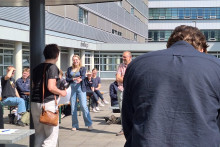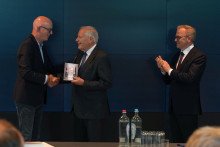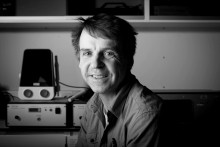 |
| Jos Brouwers |
China is not new for Brouwers. `My wife is Chinese so I know a bit about the country and the language.' Moreover, he was a researcher for ten years and in contact with the university in Wuhan. `I once was invited by professor Shui to give a reading. The contact intensified after that initial invitation. In 2003 a Chinese PhD student came to Enschede, and this year, one of my students is doing his graduation thesis work in China. Furthermore, the faculty of Engineering Technology had signed a Cooperation Agreement with Wuhan in 2003.'
The Silicate Building Materials department focuses mainly on the study of stone-like building materials such as concrete, bricks and cement, but also the use of fly ash and energy conservation. They conduct research into the construction of high-speed railway lines and the building of two bridges with `enormous spans.' According to Brouwers, the sustainable nature of the building materials is important. `A lot of material is wasted at the moment, but the Chinese government is taking measures to deal with commodities and energy in a more efficient way. The national policy is that the energy consumption per GNP needs to be lowered by twenty percent in 2011.'
`When the Chinese government makes such a decision, it immediately handles the decision on a large scale,' says Brouwers. `The organization of the Olympic Games is an important stimulus for environment protection. Therefore, the Chinese have noticed that the cost of energy and commodities is rising and they need to use both more efficiently. Population growth of the country used to be the most important factor, now the environment issue is catching up.'
`It might be a coincidence, but I had the idea that the air in Wuhan was cleaner than when I last visited two years ago,' he adds. Wuhan is the capital of the Hubei province. The city has eight million inhabitants and the Wuhan University of Technology has about forty-five thousand students enrolled from thirty different counties.
Brouwers reflects that China has over 1000 universities. `Wuhan is amongst the top 50, but the Silicate Building Materials department is on the verge of being promoted to a spearhead laboratory. That is the highest possible level, making Wuhan unique in China. It doesn't only mean more recognition, but also more money to invest in projects.'
Because Wuhan University is a top university, they have the best students. It is noticeable, says Brouwers. `The students are really diligent and competitive with each other. In the Netherlands graduates normally find a good job after graduation, but in China there are so many people that you need to work hard to stand above the rest. Only the best are picked for the good jobs.'
The choice of Wuhan University of Technology to appoint a guest professor from the University of Twente is logical, says Brouwers. `It may sound strange, but China and the Netherlands resemble each other. When you leave language out of it, you can place the Chinese department here without a problem. America is a land of steel, but China and the Netherlands use a lot of bricks and concrete. Moreover, they have a virtually identical norm to ours. The materials are tested in the same way.'
In practice, the guest professor appointment means that Brouwers will travel to Wuhan once a year to teach for one or two weeks. He will supervise the research at Wuhan from Enschede. `As a guest professor, I can act as a PhD supervisor for the four current PhD students in Enschede and also conduct interviews in China for two more PhD positions. My ambition is to get more consensual PhD projects and more students that can do their graduation work in China. There is a possibility to recruit Chinese students for master's degrees in Twente. I have seen some of the Chinese dissertations and when translated into English, they might have been from here.'







